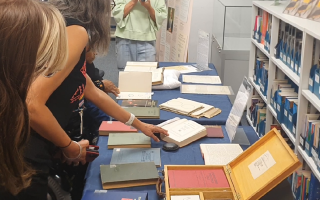About the Prejudice in Power programme

Eugenic thinking is present in the racism, ableism, homophobia and reproductive controls we see today. This programme will take a critical look at UCL’s history of eugenics and its ongoing impact through the structural inequities eugenic thinking left as a legacy.
By illuminating the spurious and unsound nature of eugenics, the discriminative notions of ‘normality’ and ‘superiority’, and UCL’s historic role in promoting the pseudoscience, the programme will unpack the impact this prejudice has in the university and in society. This will include a creative and dialogic programme of co-created projects, displays and exhibitions, a fellowship and a public art commission.
With collaboration and co-creation at the heart of this project, we’re engaging with marginalised groups to prompt inclusive thinking. In sharing the lived experiences of those impacted and excluded by eugenic ideas, we hope to provide a platform for societal change and reparative healing.
Image: Plaster life mask of Count Franz von Thun un Hohenstein, circa 1838. Part of Robert Noel's Casts of Intellectuals series. © UCL
Background
In 2018, UCL's previous President & Provost Professor Michael Arthur commissioned an inquiry led by Professor Iyiola Solanke of the University of Leeds to look at UCL’s historical role in, and current teaching and study of, the history of eugenics, as well as the current status of UCL’s benefit from any financial instruments linked to the study of eugenics.
The Inquiry's report and its recommendations were published on 28 February 2020 and accepted in principle by the university. UCL has established a working group to consider how the university can respond to the recommendations. On 7 January 2021, UCL issued a formal public apology for its history and legacy of eugenics, as part of a range of actions to acknowledge and address its historical links with the eugenics movement.
 Close
Close




